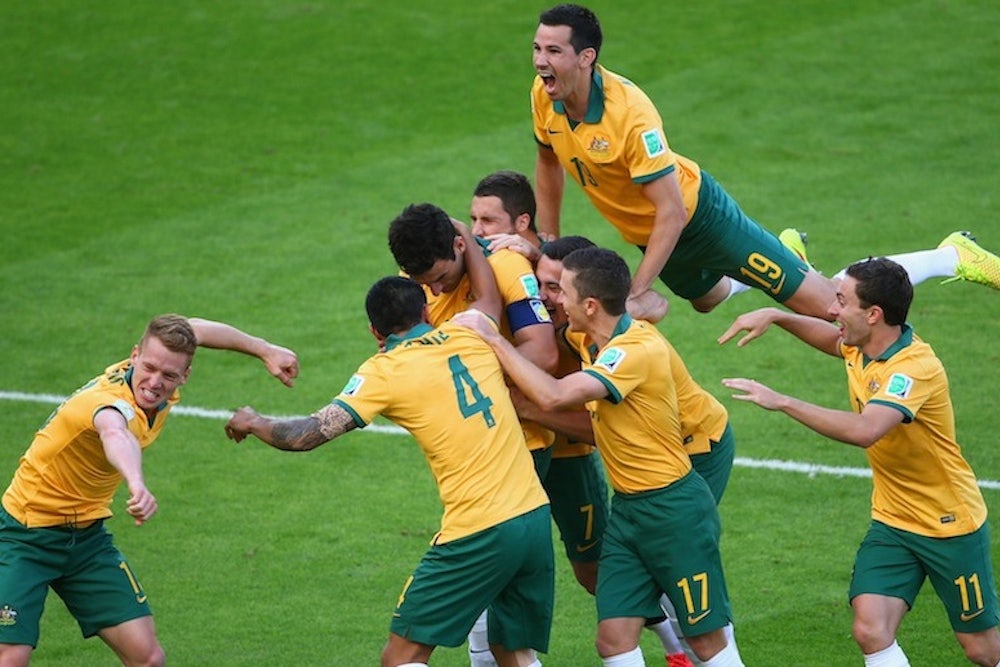We are now in the second cycle of group stage matches in the World Cup, and some of us addicts are already afraid that it’ll all be over soon. But what a tournament it’s been! From today’s Australia-Netherlands thriller to the same (surprising) Dutch side’s 5-1 thumping of defending champions Spain to the USA’s last-gasp winner against Ghana, there’s been nary a dull moment. (Okay, except maybe Nigeria vs. Iran.) But this World Cup hasn’t just seemed especially exciting. Statistically, it’s on pace to be a historic tournament, at least where offensive football is concerned. For all the pre-tournament talk about heat and humidity sapping teams of their energy and slowing the games down, 2014 is shaping up to be the highest-scoring World Cup ever. More goals have been scored at this point than in any past World Cup, going all the way back to the competition’s beginnings in 1930. In the first 16 matches, there were 49 goals—a phenomenal average of 3.06 goals per game. By comparison, at this same point in 2010, the tournament was averaging a measly 1.56 goals per match.

The scoring barrage is no fluke. Over the past four years, with some exceptions (including a big one named Jose Mourinho), elite football has become more offensive-minded as a whole. In Europe’s top leagues, where over half of the World Cup players ply their trade, the average number of goals per match has been consistently on the rise. According to The Telegraph, the Premier League averaged 2.58 goals per game between 2006 and 2010. Since then, that number has jumped to 2.79, and the trend holds true in Spain, Germany, and Italy. Possession-based football—most famously Spain’s tiki-taka—is looking vulnerable, as the counterattacking style has reasserted itself. Many teams are now happy to let the other team have the ball, then exploit space and hit their opponents on the back foot when chances come. That’s how the Dutch were able to send so many diagonal balls past the Spanish’s high defensive line, or how Belgium got their lovely winning goal against Algeria.
If all the goals don’t convince you that Brazil 2014 is something special, consider this: It’s also set an all-time World Cup record for longest run without a draw. It took until the 13th match, the aforementioned Iran-Nigeria slumber party, for the first 0-0, while in South Africa, we had to wait until the third game for a match to producer a winner and loser. There’s still only been three draws so far—half the amount of 2010 at this point—and one of them was Mexico’s heroic display against Brazil (which was anything but boring). South Africa also saw six teams eke out 1-0 wins during the first 16 games. This time, it’s only happened once, when Mexico beat Cameroon in a game that saw two goals wrongfully disallowed. Taking the lead assures nothing in this tournament; six teams have come from behind to win so far. Only four teams managed to do so in the entirety of World Cup 2010.
A final statistic of note: there have been six penalties so far, compared to only one at the same point in South Africa. Two (Spain’s against Holland and Brazil’s against Croatia) were bad calls, while Germany’s against Portugal was also questionable. Because football is so low-scoring, a penalty changes the entire game—and in some cases, determines it—and on balance it’s more unjust for a team to have been wrongfully given a penalty than to have been denied one, as has happened to Mexico and Portugal. But here’s the thing: in half of the games in which penalties have been awarded, the team that scored on them went on to lose the game. The non-call for Mexico didn’t stop it from beating Cameroon, and a penalty wouldn’t have saved Portugal against the Germans. The 2014 World Cup: So far, even the referees can’t screw it up!
